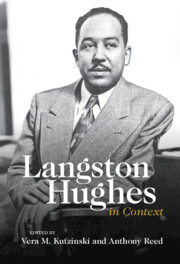Book contents
- Langston Hughes in Context
- Langston Hughes in Context
- Copyright page
- Contents
- Contributors
- Abbreviations
- Introduction
- Part I Singing America
- Chapter 1 Langston Hughes, Chicago, and Modernism
- Chapter 2 Jazz, Performance, and Modernist Embodiment in Langston Hughes’s Early Writing
- Chapter 3 His Ways with White Folks
- Chapter 4 Love at a Distance in Selected Letters by Langston and Carrie Hughes
- Chapter 5 Langston Hughes’s 1930s Short Fiction
- Chapter 6 Langston Hughes and Simple
- Chapter 7 Langston Hughes’s Famous Books, Ebony Magazine, and the Politics of Civil Rights in Biographies for the Young
- Chapter 8 Rural Black Masculinity and the Blues in Not without Laughter
- Chapter 9 From the Sublime to the Grotesque
- Chapter 10 Coalitional Aesthetics
- Chapter 11 Langston Hughes’s Translingual Poetics and Pedagogy
- Part II The Global Langston Hughes
- Part III Afterlives
- Index
Chapter 11 - Langston Hughes’s Translingual Poetics and Pedagogy
from Part I - Singing America
Published online by Cambridge University Press: 10 November 2022
- Langston Hughes in Context
- Langston Hughes in Context
- Copyright page
- Contents
- Contributors
- Abbreviations
- Introduction
- Part I Singing America
- Chapter 1 Langston Hughes, Chicago, and Modernism
- Chapter 2 Jazz, Performance, and Modernist Embodiment in Langston Hughes’s Early Writing
- Chapter 3 His Ways with White Folks
- Chapter 4 Love at a Distance in Selected Letters by Langston and Carrie Hughes
- Chapter 5 Langston Hughes’s 1930s Short Fiction
- Chapter 6 Langston Hughes and Simple
- Chapter 7 Langston Hughes’s Famous Books, Ebony Magazine, and the Politics of Civil Rights in Biographies for the Young
- Chapter 8 Rural Black Masculinity and the Blues in Not without Laughter
- Chapter 9 From the Sublime to the Grotesque
- Chapter 10 Coalitional Aesthetics
- Chapter 11 Langston Hughes’s Translingual Poetics and Pedagogy
- Part II The Global Langston Hughes
- Part III Afterlives
- Index
Summary
This chapter explores Hughes’s investments in and invocation of foreign language teaching. It reads his 1925 Crisis poem, “To a Negro Jazz Band in a Parisian Cabaret,” as a spectacularly unsuccessful foreign language lesson that rejoices in the failure of language countability and acquisition. By casting doubt on the viability of language mastery, the poem opens a space for nonnormative, emergent, and playful communication that responds to and cultivates environments that defy neat national and linguistic arrangements. In so doing, it anticipates a model of language instruction that present-day theorists of English Composition have termed a translingual approach, a social justice model that privileges the language habits and contexts of people who have typically been ignored, if not denigrated, in composition classrooms. This chapter uses this model to think through how “Negro Jazz Band” defunds projects of elitist, multilingual proficiency and replaces them with emancipatory, translingual play.
- Type
- Chapter
- Information
- Langston Hughes in Context , pp. 115 - 126Publisher: Cambridge University PressPrint publication year: 2022

